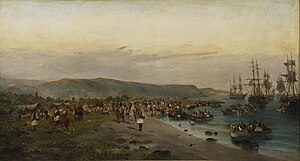
The Greek War of Independence, also known as the Greek Revolution or the Greek Revolution of 1821, was a successful war of independence by Greek revolutionaries against the Ottoman Empire between 1821 and 1829. In 1826, the Greeks were assisted by the British Empire, Kingdom of France, and the Russian Empire, while the Ottomans were aided by their vassals, especially by the Eyalet of Egypt. The war led to the formation of modern Greece, which would be expanded to its modern size in later years. The revolution is celebrated by Greeks around the world as independence day on 25 March.
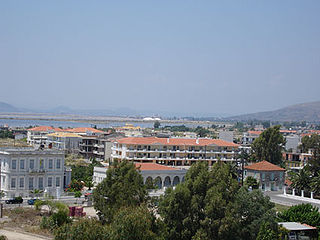
Missolonghi or Mesolongi is a municipality of 32,048 people in western Greece. The town is the capital of Aetolia-Acarnania regional unit, and the seat of the municipality of Iera Polis Mesolongiou. Missolonghi is known as the site of a dramatic siege during the Greek War of Independence, and of the death of poet Lord Byron.
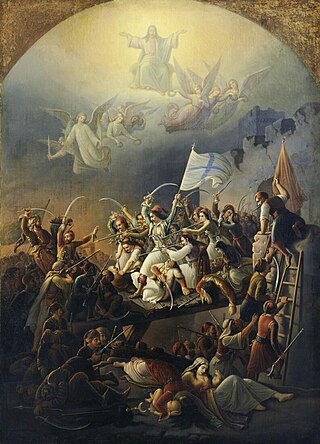
The Third Siege of Missolonghi was fought in the Greek War of Independence, between the Ottoman Empire and the Greek rebels, from 15 April 1825 to 10 April 1826. The Ottomans had already tried and failed to capture the city in 1822 and 1823, but returned in 1825 with a stronger force of infantry and a stronger navy supporting the infantry. The Greeks held out for almost a year before they ran out of food and attempted a mass breakout, which however resulted in a disaster, with the larger part of the Greeks slain. This defeat was a key factor leading to intervention by the Great Powers who, hearing about the atrocities, felt sympathetic to the Greek cause. Their support would prove decisive in helping the Greeks win the war and gain independence.

Georgios Karaiskakis, born Georgios Karaiskos, was a Greek military commander and a leader of the Greek War of Independence.
The battle of Konya (Koniah) was fought on December 21, 1832, between Egypt and the Ottoman Empire, just outside the city of Konya in modern-day Turkey. The Egyptians were led by Ibrahim Pasha, while the Ottomans were led by Reşid Mehmed Pasha. The Egyptians were victorious.
Dionysios Vourvachis, also known as Constantin Denis Bourbaki, was a Greek officer educated in France, and serving in the French military. He fought in the last phases of the Napoleonic Wars, and after 1825, joined the Greek War of Independence. He was killed in 1827 following his defeat at the Battle of Kamatero. He is the father of French General Charles Denis Bourbaki.
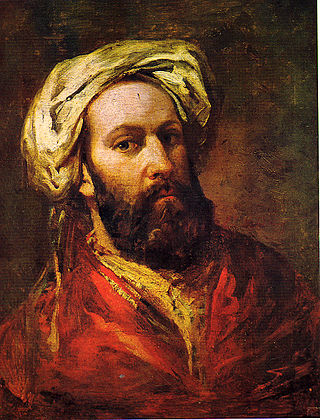
Vizier Omer Pasha Vrioni was an Ottoman Albanian military commander and ruler, and a prominent figure in the Greek War of Independence. He succeeded Ali as Pasha of Yanina.

The Battle of Alamana was fought between the Greeks and the Ottoman Empire on 22 April 1821, during the Greek War of Independence.

The Battle of Dervenakia was the Greek victory over the Ottoman forces on 6–8 August 1822, an important event in the Greek War of Independence.

Reşid Mehmed Pasha, also known as Kütahı, was an Ottoman statesman and general who reached the post of Grand Vizier in the first half of the 19th century, playing an important role in the Greek War of Independence.
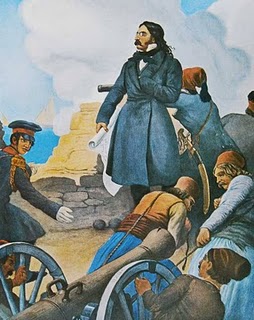
The First Siege of Missolonghi was an attempt by Ottoman forces to capture the strategically located port town of Missolonghi during the early stages of the Greek War of Independence.

The Battle of Arachova, took place between 18 and 24 November 1826 (N.S.). It was fought between an Ottoman Empire force under the command of Mustafa Bey and Greek rebels under Georgios Karaiskakis. After receiving intelligence of the Ottoman army's maneuvers, Karaiskakis prepared a surprise attack in vicinity of the village of Arachova, in central Greece. On 18 November, Mustafa Bey's 2,000 Ottoman troops were blockaded in Arachova. An 800-man force that attempted to relieve the defenders three days later failed.
The Battle of Kamatero was an armed conflict during the Greek revolution between the Greek forces under the command of the Greek ex officer of the French army, Colonel Denis Bourbaki and the Ottoman forces led by Reşid Mehmed Pasha. The battle ended with the decisive victory of the Ottomans on the night of 27 January 1827 (O.S.) in Kamatero, Greece.

The Battle of Vasilika was fought between Greek revolutionaries and the Ottoman Empire during the Greek War of Independence.

The Second Siege of Missolonghi was the second attempt by Ottoman forces to capture the strategically located port town of Missolonghi during the third year of the Greek War of Independence (1823). The second siege is usually ignored however, and the name is often applied to the greater siege of 1825–1826.

The Battle of Ohrid took place on 14 or 15 September 1464 between Albanian ruler Skanderbeg's forces and Ottoman forces. A crusade against Sultan Mehmed II had been planned by Pope Pius II with Skanderbeg as one of its main leaders. The battle near Ohrid occurred as a result of an Albanian incursion into Ottoman territory. The Ottomans stationed in the area were assaulted by Skanderbeg's men and 1,000 Venetian soldiers under Cimarosto. The Ottomans were lured out of their protections in Ohrid and ambushed by the Albanian cavalry. Skanderbeg won the resulting battle and his men earned 40,000 ducats after captured Ottoman officers were ransomed. Pius II died before the planned crusade began, however, forcing Skanderbeg to fight his battles virtually alone.

The Second Siege of the Acropolis in 1826–1827 during the Greek War of Independence involved the siege of the Acropolis of Athens, the last fortress still held by the Greek rebels in Central Greece, by the forces of the Ottoman Empire.

Karl August Krazeisen was a Bavarian soldier, philhellene and portraitist.
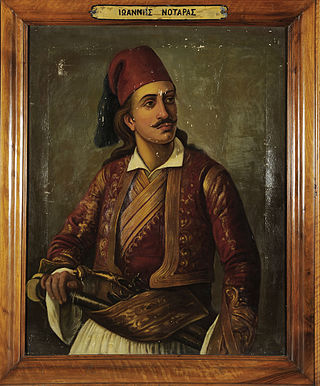
Ioannis or Giannakis Notaras was a Greek general of the Greek War of Independence. He was killed in 1827 during the Battle of Phaleron.
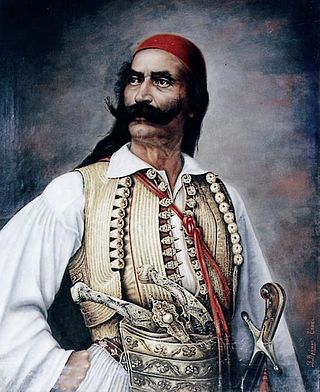
Georgios Drakos was a Souliot chieftain of the Greek War of Independence.
